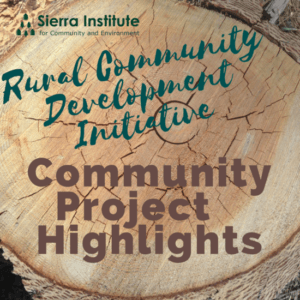
This is the third week of our series highlighting the Rural Community Development Initiative. This week’s focus is on one of our partner organizations working toward triple bottom line solutions in Calaveras County.

Calaveras Healthy Impact Product Solutions (CHIPS) was formed in 2003 to address unemployment, wildfire, and other issues facing the community by “doing good with wood.” When the non-profit group first formed they struggled with a steep learning curve and did not have the funding to support any paid staff. Nevertheless, the team- a diverse board with representation from Indian Manpower, Motherload Job Taining, social services, engineering and county supervisors- sought opportunities to increase their capacity. These opportunities came in the form of small grants and assistance from friends, but they received additional support and $500,000 of funding after sharing their project ideas and challenges through a tour of the area with Senator Dianne Feinstein and then-Congressman Dan Lungren. CHIPS worked with partner agencies and organizations to start the Amador-Calaveras Consensus Group (ACCG), which later received a $10 million Collaborative Forest Landscape Restoration grant.
Through continued efforts and assistance, CHIPS has succeeded in developing several small scale wood utilization projects. CHIPS sought advice from their mentor organization, the Watershed Research and Training Center (WRTC) in acquiring land from the BLM to develop a community forest. They have purchased an old mill site on which to build a three megawatt gasification facility that will provide heat to a Native American greenhouse and create enough electricity to power 1,500 homes. The facility will use the byproducts from restoration projects on the El Dorado and Stanislaus National Forests to produce energy, creating a market for otherwise worthless material and disposing of forest waste more cleanly.
CHIPS continues to face challenges, including the 72,000 acre Butte Fire in 2015, diversion of funding to fire recovery projects, turnover in partner agencies and organizations, and repeated setbacks in the planning and interconnection process. There are still social and financial hardships in the area, and CHIPS has unfortunately struggled with addiction and poor work ethic on their restoration crews. An ongoing challenge has been the difficulty retaining a trained workforce when the organization can only sustain seasonal employment. Despite these setbacks, CHIPS continues to seek solutions for healthy communities, economies, and forests. To that end, CHIPS offers opportunities and training in restoration work in a community with few employment options, and has achieved a number of successes, such as the Miwok youth hired as an intern who now works as a crew foreman.
Though the project struggled- and continues to struggle- to get underway, the bioenergy facility has made significant progress in the last few years. CHIPS received a power purchase agreement in 2017 which allows them to export electricity produced by the system to PG&E and move forward with the development of the bioenergy facility. They also have $1 million worth of agreements to work on four national forests over the next five years, ensuring that the system will have a consistent supply of material to convert. These recent successes have increased the capacity of CHIPS as an organization. In 2018, CHIPS will finally be able to hire an executive director, and will be in a position to hire some of its 50 seasonal employees into year round positions for the first time.
Sierra Institute continues to advocate for CHIPS and our other RCDI communities, by supporting programs and legislation that will enable small scale wood utilization projects to complete much needed restoration work while creating jobs in rural communities.


